- News
- Reviews
- Bikes
- Components
- Bar tape & grips
- Bottom brackets
- Brake & gear cables
- Brake & STI levers
- Brake pads & spares
- Brakes
- Cassettes & freewheels
- Chains
- Chainsets & chainrings
- Derailleurs - front
- Derailleurs - rear
- Forks
- Gear levers & shifters
- Groupsets
- Handlebars & extensions
- Headsets
- Hubs
- Inner tubes
- Pedals
- Quick releases & skewers
- Saddles
- Seatposts
- Stems
- Wheels
- Tyres
- Tubeless valves
- Accessories
- Accessories - misc
- Computer mounts
- Bags
- Bar ends
- Bike bags & cases
- Bottle cages
- Bottles
- Cameras
- Car racks
- Child seats
- Computers
- Glasses
- GPS units
- Helmets
- Lights - front
- Lights - rear
- Lights - sets
- Locks
- Mirrors
- Mudguards
- Racks
- Pumps & CO2 inflators
- Puncture kits
- Reflectives
- Smart watches
- Stands and racks
- Trailers
- Clothing
- Health, fitness and nutrition
- Tools and workshop
- Miscellaneous
- Buyers Guides
- Features
- Forum
- Recommends
- Podcast
review
£4,399.00
VERDICT:
You can't argue with the performance - this is a better bike than its predecessor
Weight:
6,889g
Contact:
www.orbea.com
At road.cc every product is thoroughly tested for as long as it takes to get a proper insight into how well it works. Our reviewers are experienced cyclists that we trust to be objective. While we strive to ensure that opinions expressed are backed up by facts, reviews are by their nature an informed opinion, not a definitive verdict. We don't intentionally try to break anything (except locks) but we do try to look for weak points in any design. The overall score is not just an average of the other scores: it reflects both a product's function and value – with value determined by how a product compares with items of similar spec, quality, and price.
What the road.cc scores meanGood scores are more common than bad, because fortunately good products are more common than bad.
- Exceptional
- Excellent
- Very Good
- Good
- Quite good
- Average
- Not so good
- Poor
- Bad
- Appalling
Stiff, light , good looking – and comfortable to ride, when the last incarnation of the Orca hit the streets back in 2006 I really liked it. This was one of the first bikes to demonstrate that the bike industry was really getting to grips with the possibilities carbon had to offer, and it sure was pretty too – which helps. So there's a lot riding on the 2009 makeover.
See more pics of the Orbea Orca
What's different?
Essentially the frame is lighter and stiffer. The dropouts, and headbadge (which also acts as a cable guide) are now made from magnesium which Orbea reckon makes for a sub-kilo frame (875g to be precise) for a 54cm, the previous incarnation that we rode had a frame weight bang on the 1Kg mark when we rode it back in '06.
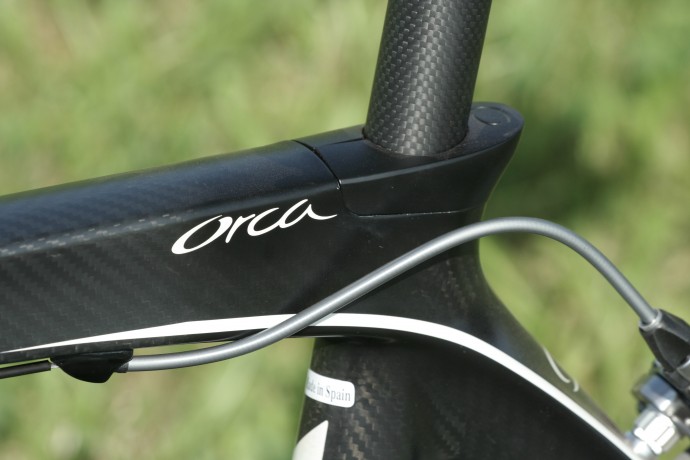
Like most manufacturers Orbea are quoting the bare frame weight here, the claimed wight when built up with the front mech hanger, headset inserts, headset, seat clamp, and fork is an entirely beleivable 1290g. Claimed weight for the complete bike is 6899g without pedals, ours weighed 7300 with – so that is spot-on too.
Weight has been shaved by refining key details, thus the front mech hanger which was stainless steel on the '08 bike is aluminium for '09 saving a whopping 6g. The cable guide which was aluminium is now carbon fibre, and the aluminium seat clamp is now magnesium and so it goes on, all these small savings adding up.
The carbon weave has been tweaked too for extra stiffness, but not at the price of comfort (which the Orbea blurb describes as "extreme"). The new frame is a 70:30 mix of Toray M30S and M40J carbon fibre – the latter being the highest grade available to bike builders.
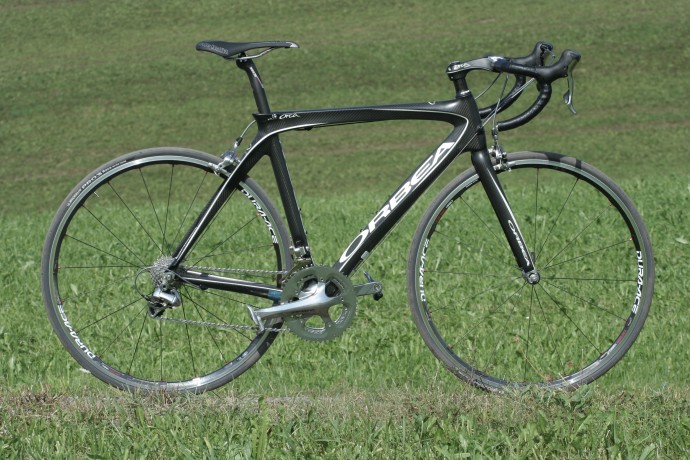
All the test bikes were Orca TDEs which come in stealth black, there are a number of different Orca models the TDI, TDE, TDC, TDF, TDA, TDB, and TDS depending on the spec - more on what's available in mo, and each has its own colourway.
What hasn't changed is that Orbea still make great play of their SSN technology, that stands for Size Specific Nerve, basically it means that the every Orca is designed to give the same ride characteristics no matter what size it is. To do this Orbea build what are essentially different bikes in each size with differences in tube profiles and thicknesses.
The "Nerve runs along the outside edge of the frame (helpfully picked out in a different colour) it varies by as much as 6mm between sizes, the variation says Orbea allows them to tune the stiffness, damping, and load transmissions for each size so that all the frames have the same stiffness to weight ratio no matter what the size.
As you would expect for a bike at this price all frames come with a lifetime warranty. The frame is a carbon monocoque and the fork is Orbea's own designed specifically to work with the frame.
So what's it like to ride?
First impressions only, but a quick blast in the German hills reveals a bike that feels light, (so it should, ours weighed 16.1lb with pedals) and has the easy, refined road manners you'd expect from a top end road bike. All is as it should be.
At its launch I rode the earlier version up the Col d'Aspin and it got me up there no problem. The demon descender I rode up with absolutely railed it back down and declared himself more than satisfied. I'm not a demon descender, but this latest Orca is a bike that even I could feel confident letting rip on the descents.
Going up is pretty good too, our test bike came equipped with a full Dura Ace drivetrain with a 52-39 chainset at the front matched with what looked like an 11-23 cassette at the back. It's a classic combo that worked well enough on the short sharp hills of our test circuit, although I'd probably prefer a 12-25 for the really big stuff or even the Dura Ace triple, but then I'm a wimp.
Contact points are all well taken care of - as per the earlier version. I realy liked the Zeus bars which have a fairly shallow drop and a classic curve – very comfortable and plenty stiff. Wheels are Dura Ace too – I've never ridden these hoops before and a quick ride didn't really give me the time to form an opinion, but they seemed pretty good – as you'd expect from something tagged Dura Ace.
The Orca is also available in a choice of build kits, so if the Dura Ace TDE isn't your bag at £4399, there are plenty of other options to chose from:
TDi – Campag Super Record, £4999
TDC – SRAM Red, £4399
TDF – Campag Chorus, £4299
TDA – Campag Centaur, £3199
TBP – Shimano Ultegra SL, £3199
TDS – SRAM Rival, £2199
Verdict
As I said at the top, I really liked the original "new" version of the Orca and in my experience what look like improvements on paper don't always translate to the road. Not this time though, a good bike just got better. There look to be some bargains in the range too, I certainly wouldn't say no to the TBP with Ultegra SL and Mavic Ksyrium Elite wheels at £3199… well, if I had the money.
road.cc's founder and first editor, nowadays to be found riding a spreadsheet. Tony's journey in cycling media started in 1997 as production editor and then deputy editor of Total Bike, acting editor of Total Mountain Bike and then seven years as editor of Cycling Plus. He launched his first cycling website - the Cycling Plus Forum at the turn of the century. In 2006 he left C+ to head up the launch team for Bike Radar which he edited until 2008, when he co-launched the multi-award winning road.cc - finally handing on the reins in 2021 to Jack Sexty. His favourite ride is his ‘commute’ - which he does most days inc weekends and he’s been cycle-commuting since 1994. His favourite bikes are titanium and have disc brakes, though he'd like to own a carbon bike one day.














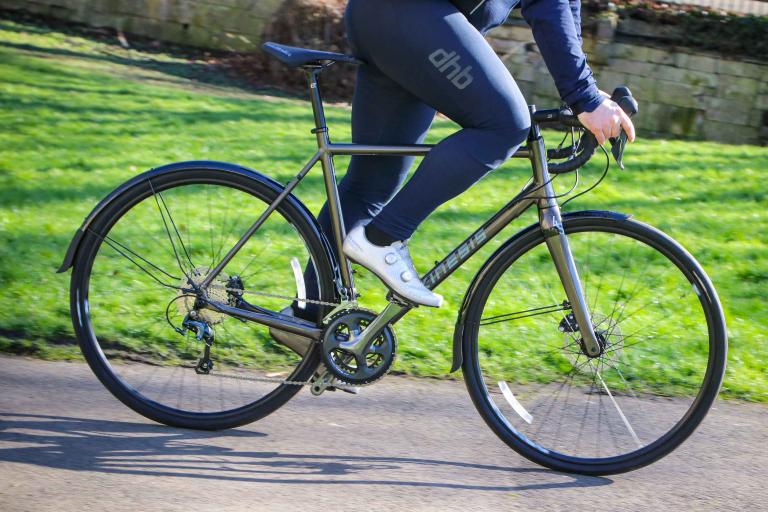
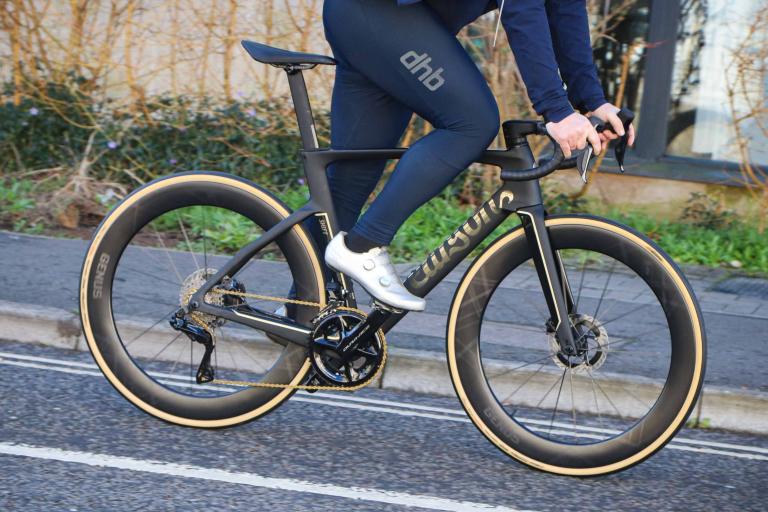
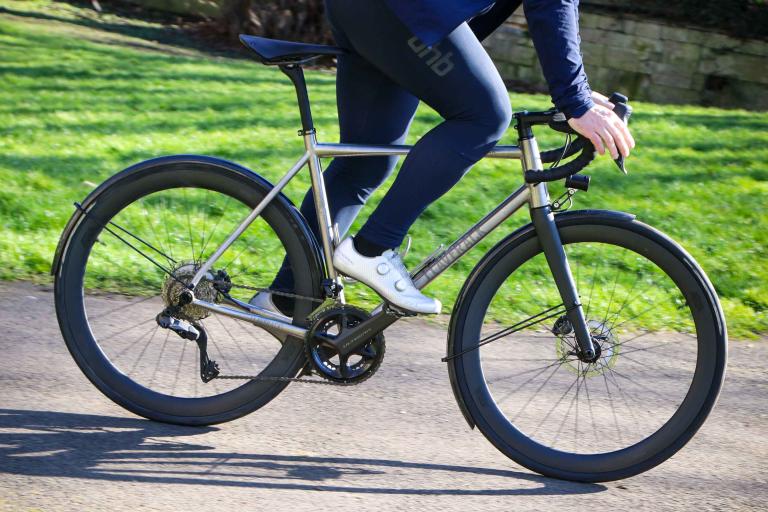
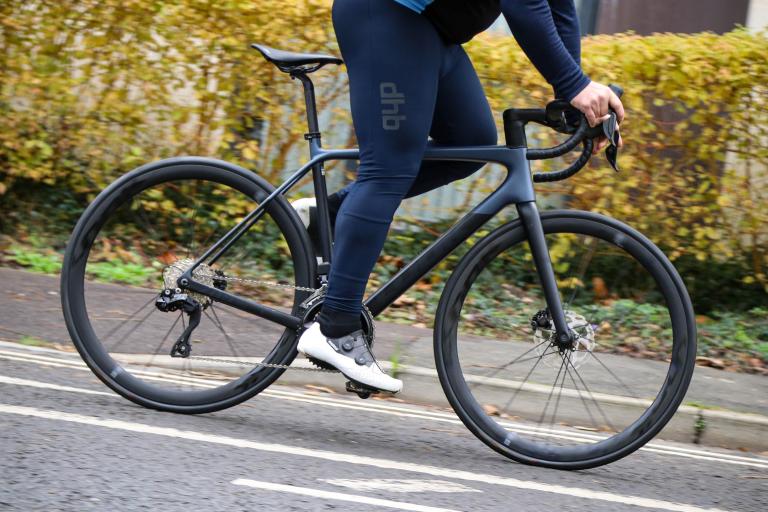
Let's hope it doesn't mean there are 17 more...
cyclists should be made to have number plates - Interesting police video here of the range of illegal number plates - we'd got, as the caption says...
Some kind of lens cleaner apparently
The trailer seems to connect to both ends of the rear axle. Can it do tight corners without dragging the tyre sideways?
Motorists have always been unkind to cyclists, but distracted driving is adding to the problem....
Have you owned Bont shoes? In my experience even the widest Lake shoes have had a bizarre form of narrowing way too much in the toe area. But the...
Not sure if this is possible, but this news letter goes out all over the world, and some places like Decathlon does not send stuff to America, in...
I'm confused as to why you'd need bib shorts indoors.
I'm sure you were being sarcastic... however ... Lewis Hamilton lives in Monaco. Yet another car driver that doesn't pay any tax
Paddington Harrow Road crash leaves two seriously injured...